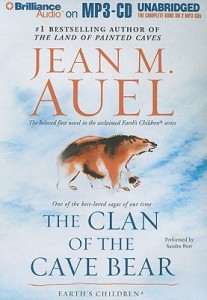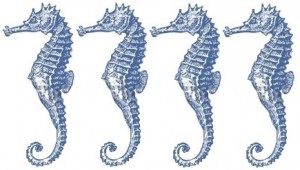Go ahead and chastise me now. Yes, I’m one of the few who hadn’t read Jean M. Auel’s Clan of the Cave Bear © 1980. Until now. Along with the rest of the world, you read the book, and perhaps the series, long ago. You already formed your opinion. What follows is mine.
 I listened to the Brilliance Audio CD version, narrated by Sandra Burr.
I listened to the Brilliance Audio CD version, narrated by Sandra Burr.
In brief, an earthquake collapses a cave containing a clan of Cro-Magnon people and the only survivor is a five-year-old girl named Ayla. She is taken in by a clan of Neanderthals and her differences from them complicate all their lives.
The novel seemed, to this listener, to be authoritative and well-researched. I liked how the author didn’t paint the lives of these prehistoric people as being simple; these characters had complex lives and traditions, as well as sophisticated knowledge of their environment. I found the characters to be distinct, memorable, and intriguing. Descriptions of the settings and characters were vivid, making the events of the book easy to imagine.
I thought the conflicts in the novel were clear and challenging, both the inter-character conflicts and the conflicts with the environment. The conflicts posed bedeviling problems for the characters, especially Ayla. I thought the book contained profound lessons about leadership, with both positive and negative examples. Anyone aspiring to lead a team would do well to emulate Brun, the clan leader through much of the novel. Moreover, Jean M. Auel wrote in an easy-to-read style that flowed well. Sandra Burr did commendable job of narration.
However, I found the novel repetitive, as if the author felt she had to remind the forgetful reader of previous events and who the characters were, on a frequent basis. In addition, for every big decision made by any character, the entire deliberative thought process was described. The author presents detailed pros and cons for every choice. Once the reader understands the motives driving a character, it’s no longer necessary to drag the reader through the careful weighing of pluses and minuses.
I found the point-of-view changes distracting at times. Auel did a fair job of signaling which character’s POV we were in, but it’s not necessary to describe how each major character feels about significant events; the reader can discern a good deal of that from expressions and actions. In fairness to Auel, it’s possible she also signaled POV changes using breaks in the text, something I couldn’t tell from listening to an audiobook.
A few events in the book strained credibility, though these events were necessary, perhaps, to make the novel relevant to our present and to help readers identify with Ayla. They included (1) Ayla becoming a huntress despite strict clan tradition against that; (2) Ayla learning, with apparent ease, every Neanderthal skill including cooking, medicine, weapon-making, tool-making, as well as hunting; (3) Ayla reasoning out the connection between sexual intercourse and pregnancy as well as the fact that people are products of a father as well as a mother; and (4) the holy man Creb foreseeing the end of the Neanderthal people.
 Taking strengths with weaknesses, I’ll give the book a rating of four seahorses using my much-coveted book review rating method. The novel deserved its good reputation and popularity. I don’t need to recommend you read it, since the only remaining person who hadn’t read it was —
Taking strengths with weaknesses, I’ll give the book a rating of four seahorses using my much-coveted book review rating method. The novel deserved its good reputation and popularity. I don’t need to recommend you read it, since the only remaining person who hadn’t read it was —
Poseidon’s Scribe
